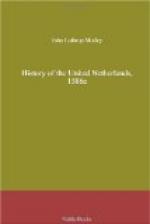The party of the States-General, as opposed to the Leicester party, was guided by the statesmen of Holland. At a somewhat later period was formed the States-right party, which claimed sovereignty for each Province, and by necessary consequence the hegemony throughout the confederacy, for Holland. At present the doctrine maintained was that the sovereignty forfeited by Philip had naturally devolved upon the States-General. The statesmen of this party repudiated the calumny that it had therefore lapsed into the hands of half a dozen mechanics and men of low degree. The States of each Province were, they maintained, composed of nobles and country-gentlemen, as representing the agricultural interest, and of deputies from the ‘vroedschappen,’ or municipal governments, of every city and smallest town.
Such men as Adrian Van der Werff, the heroic burgomaster of Leyden during its famous siege, John Van der Does, statesman, orator, soldier, poet, Adolphus Meetkerke, judge, financier, politician, Carl Roorda, Noel de Carom diplomatist of most signal ability, Floris Thin, Paul Buys, and Olden-Barneveld, with many others, who would have done honour to the legislative assemblies and national councils in any country or any age, were constantly returned as members of the different vroedschaps in the commonwealth.
So far from its being true then that half a dozen ignorant mechanics had usurped the sovereignty of the Provinces, after the abjuration of the Spanish King, it may be asserted in general terms, that of the eight hundred thousand inhabitants of Holland at least eight hundred persons were always engaged in the administration of public affairs, that these individuals were perpetually exchanged for others, and that those whose names became most prominent in the politics of the day were remarkable for thorough education, high talents, and eloquence with tongue and pen. It was acknowledged by the leading statesmen of England and France, on repeated occasions throughout the sixteenth century, that the diplomatists and statesmen of the Netherlands were even more than a match for any politicians who were destined to encounter them, and the profound respect which Leicester expressed for these solid statesmen, these “substantial, wise, well-languaged” men, these “big fellows,” so soon as he came in contact with them, and before he began to hate them for outwitting him, has already appeared. They were generally men of the people, born without any of the accidents of fortune; but, the leaders had studied in the common schools, and later in the noble universities of a land where to be learned and eloquent was fast becoming almost as great an honour as to be wealthy or high born.
The executive, the legislative, and the judiciary departments were more carefully and scientifically separated than could perhaps have been expected in that age. The lesser municipal courts, in which city-senators presided, were subordinate to the supreme court of Holland, whose officers were appointed by the stadholders and council; the supplies were in the hands of the States-Provincial, and the supreme administrative authority was confided to a stadholder appointed by the states.




